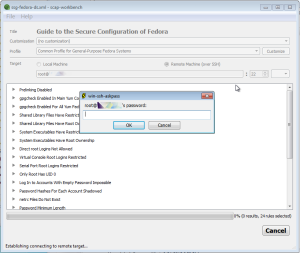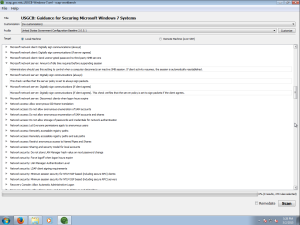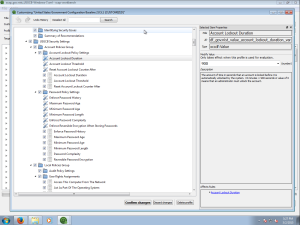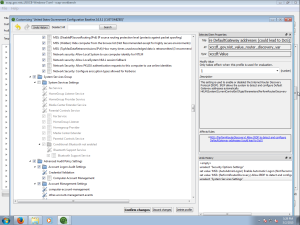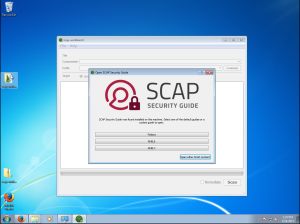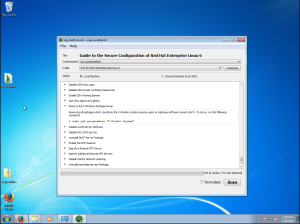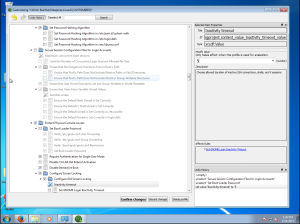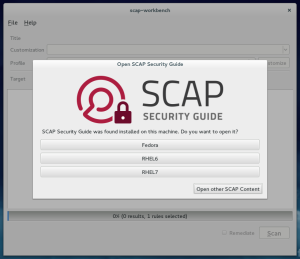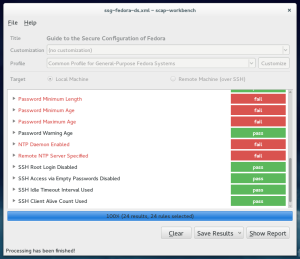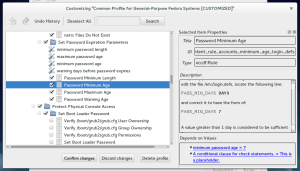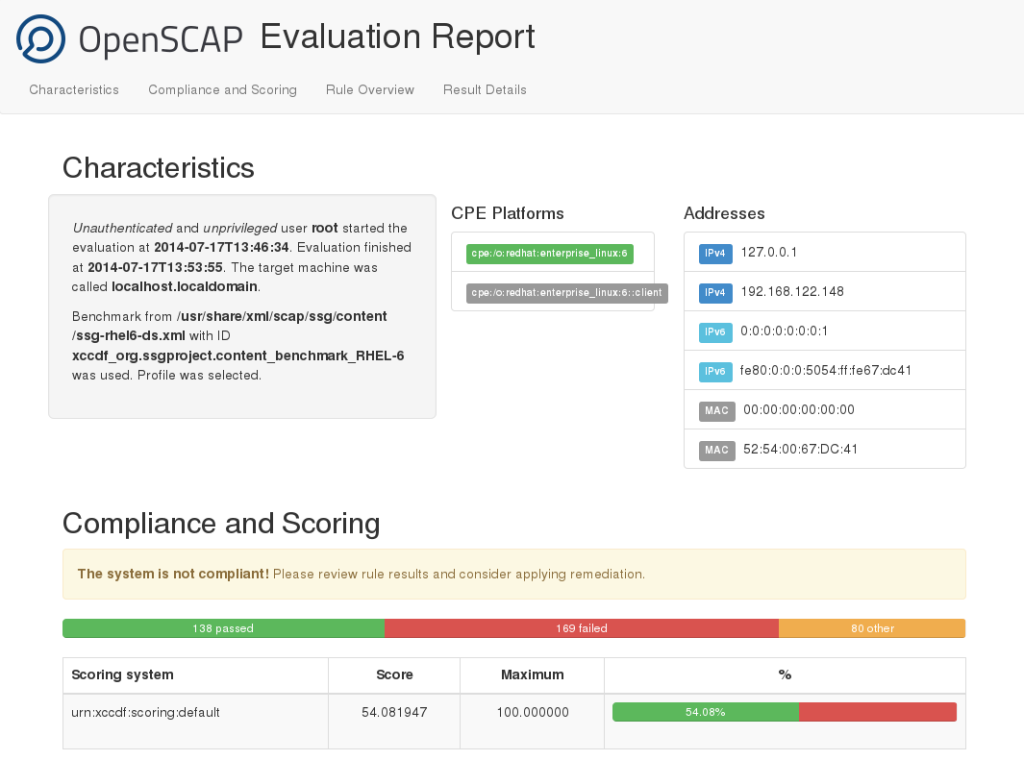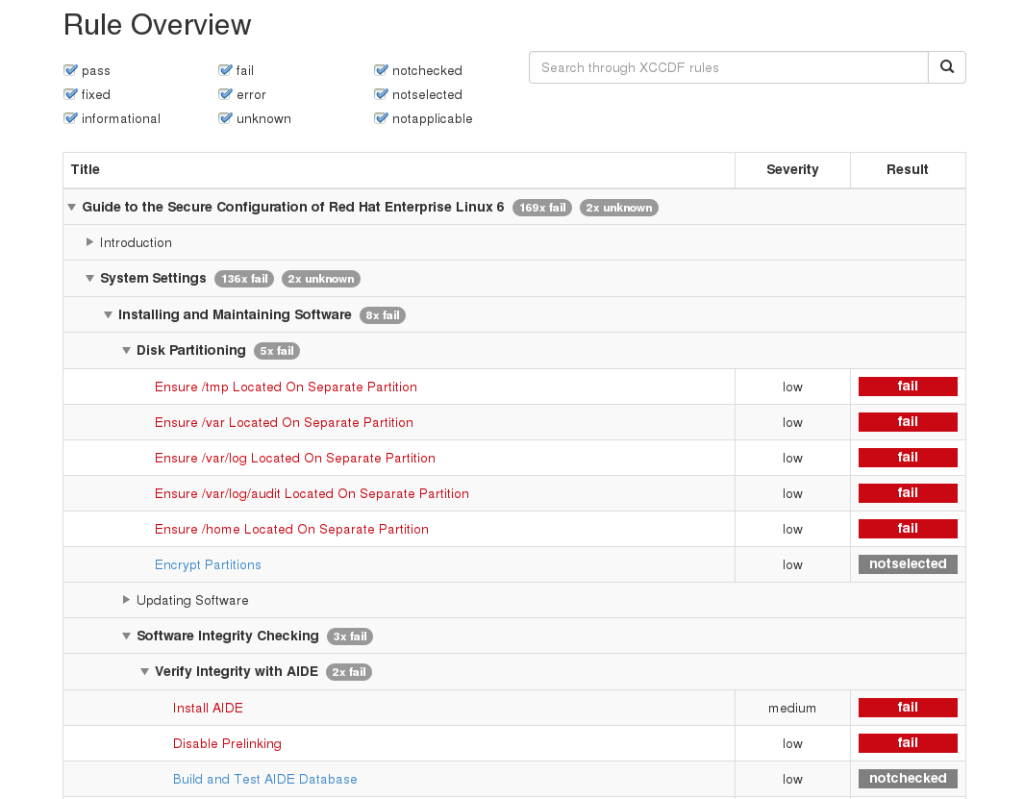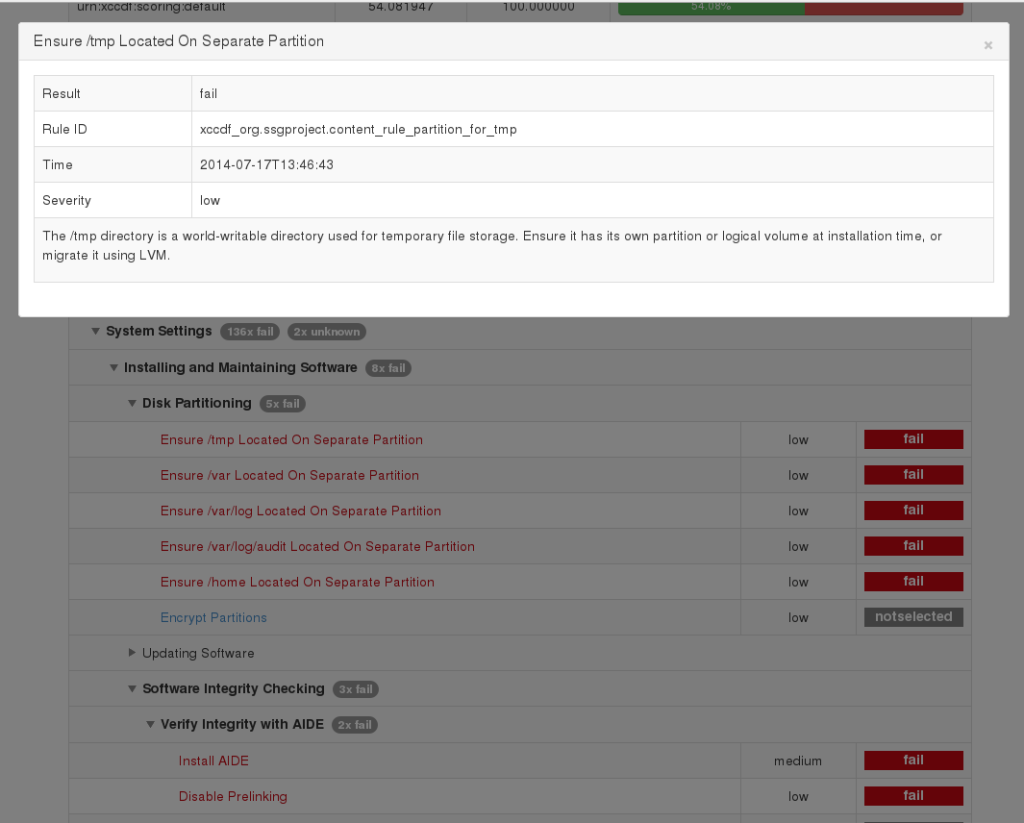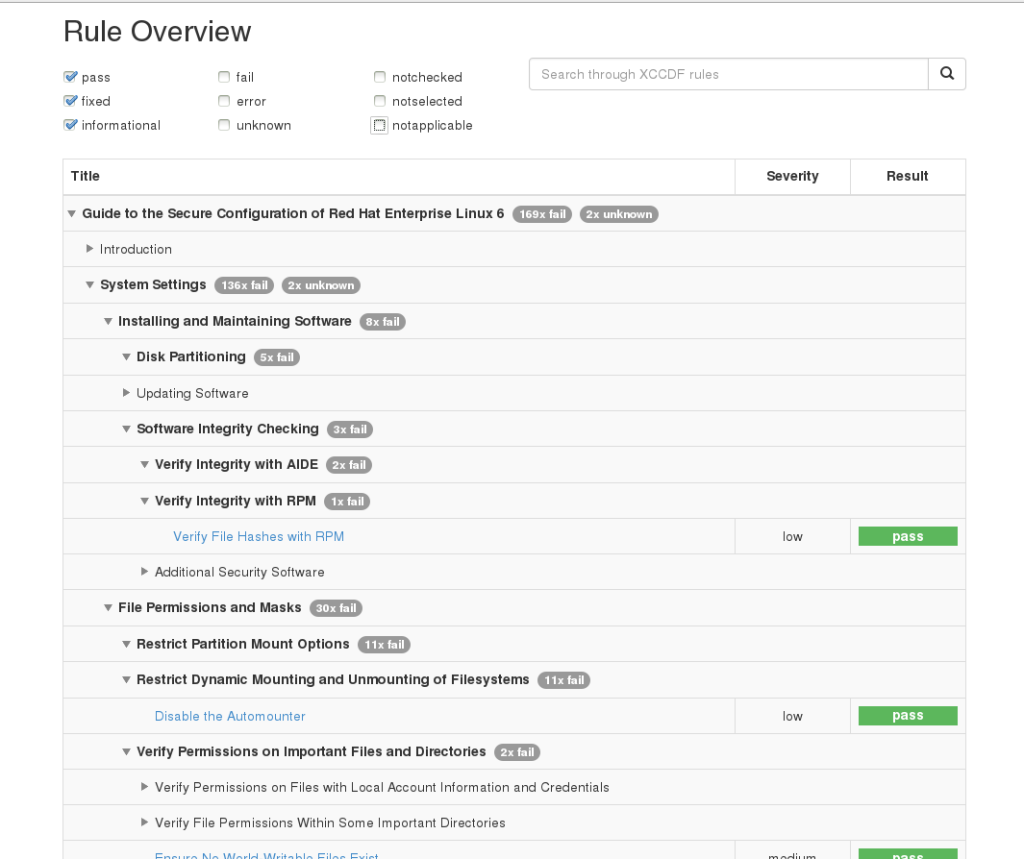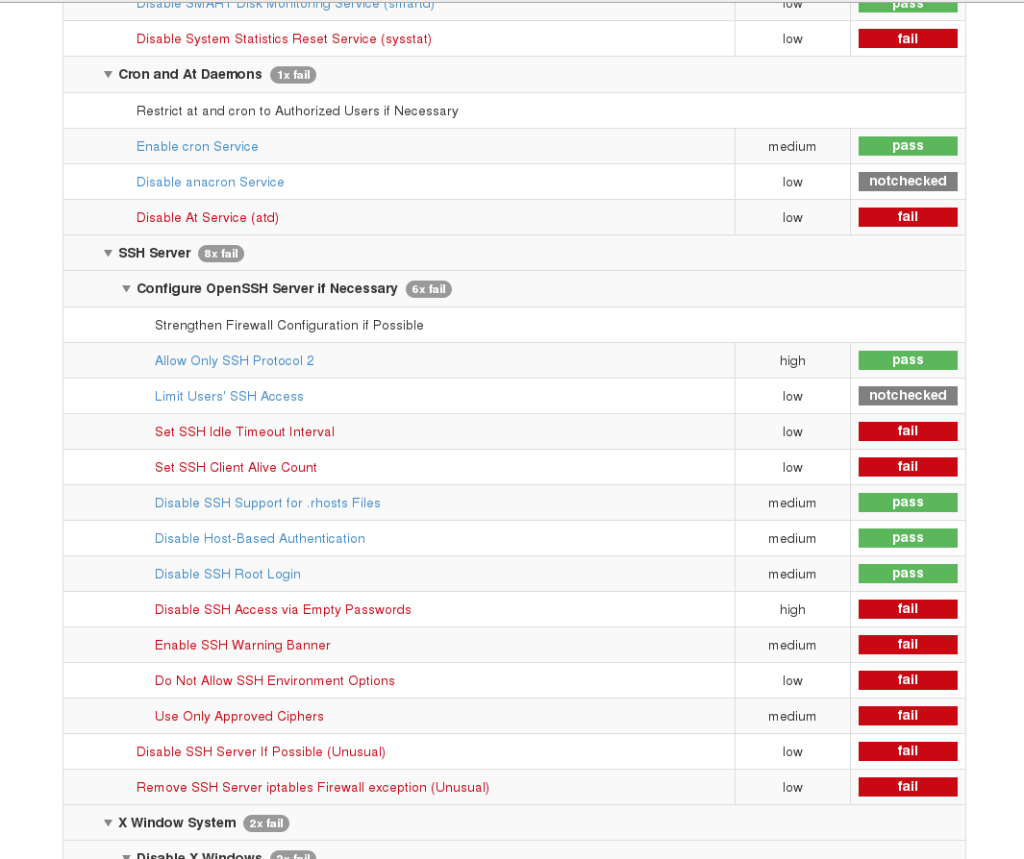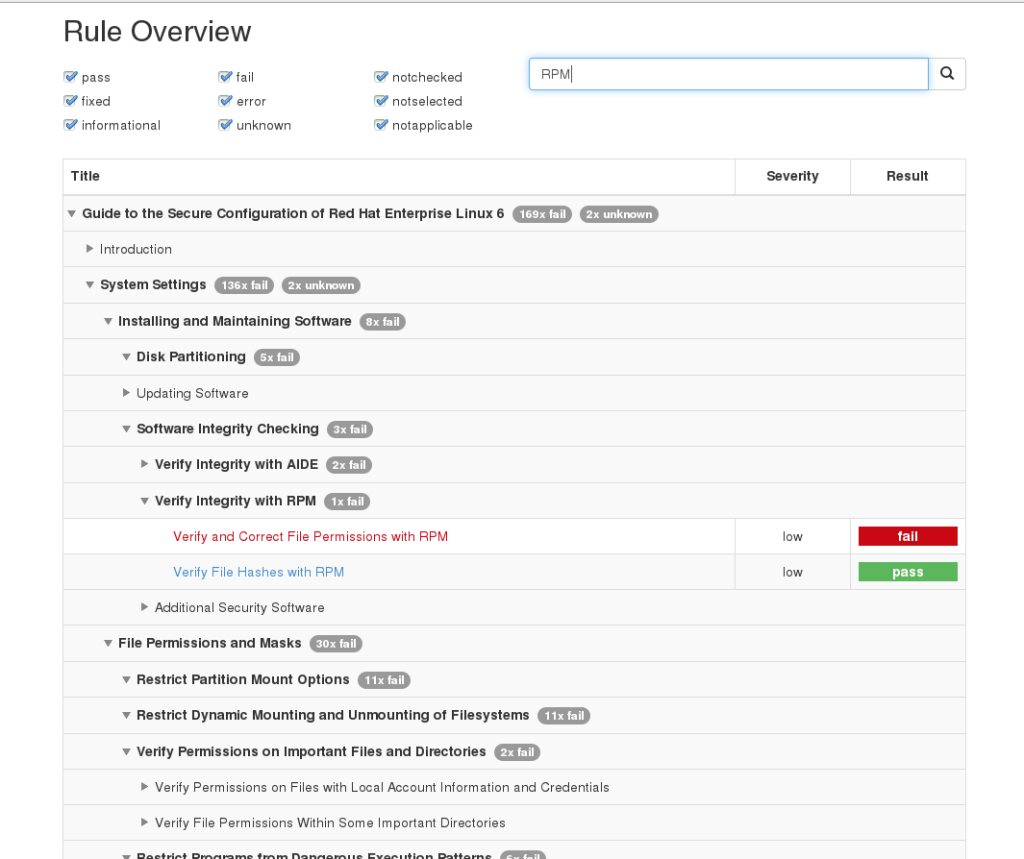XCCDF supports waivers by the means of the cdf:override element. Support for it in the openscap API has recently been greatly enhanced by Šimon Lukašík. Therefore I have looked into adding support for waivers in the HTML report.
This blog post talks about openscap master as of commit 30f9a224bc25f2127462d30ec1e4c0d499a23511.
We decided to use the term waiver instead of override. The situation looks similar to tailoring vs customization to us. Waiver should be understood by more people without even looking at any documentation.
Rule overview now shows a small label next to waived rules. This label signifies that this particular rule has at least one waiver.
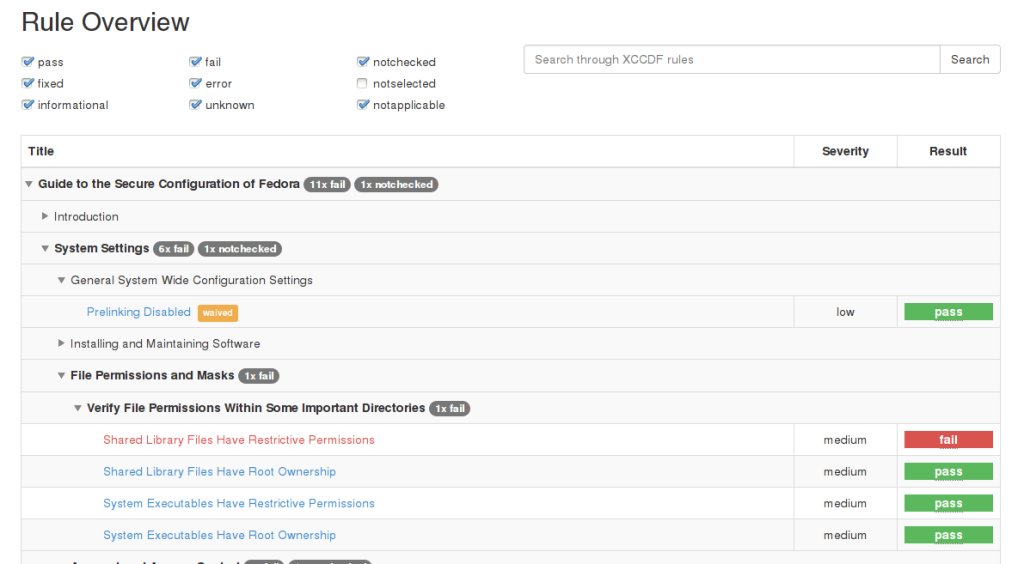
When you click on the waived rule to see the details you will be presented with description of the waiver including information on who has performed it and when. If there are more waivers they are all shown in the order they appear in the original XML file.
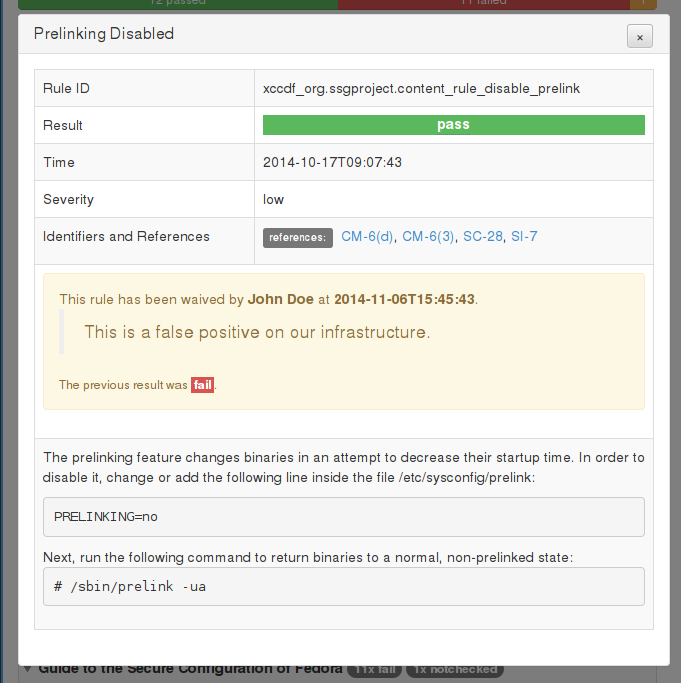
I know this feature has been requested by the community for a long time so I would like to gather some feedback to get it as right as possible.
Please note that the HTML reports themselves don’t allow you to interactively perform waivers, they just show them. As of now I don’t have plans to support interactive waivers but we may implement something like that in the future.
EDIT: I have implemented a prototype that allows interactive waivers using JavaScript. The waivers are not committed yet but I plan to commit them to master next week. Take a look at https://mpreisle.fedorapeople.org/openscap/interactive_waiver.html
Suggestions welcome!
EDIT2: Based on the feedback we decided not to include interactive waiver in the openscap reports themselves. Instead I will add HTML elements to make it easier to implement it in openscap integrations. The patch of the prototype follows and can be cleanly applied on top of 30f9a224bc25f2127462d30ec1e4c0d499a23511.
diff --git a/xsl/xccdf-report-impl.xsl b/xsl/xccdf-report-impl.xsl
index 08c50cf..f7c26f5 100644
--- a/xsl/xccdf-report-impl.xsl
+++ b/xsl/xccdf-report-impl.xsl
@@ -293,9 +293,7 @@ Authors:
<xsl:with-param name="profile" select="$profile"/>
</xsl:call-template>
</a>
- <xsl:if test="$ruleresult/cdf:override">
-  <span class="label label-warning">waived</span>
- </xsl:if>
+  <span class="label label-warning waiver-label"><xsl:if test="not($ruleresult/cdf:override)"><xsl:attribute name="style">display: none</xsl:attribute></xsl:if>waived</span>
</td>
<td style="text-align: center"><xsl:value-of select="$ruleresult/@severity"/></td>
<td class="rule-result rule-result-{$result}">
@@ -304,7 +302,7 @@ Authors:
<xsl:with-param name="ruleresult" select="$result"/>
</xsl:call-template>
</xsl:variable>
- <div>
+ <div class="inner">
<abbr title="{$result_tooltip}"><xsl:value-of select="$result"/></abbr>
</div>
</td>
@@ -606,7 +604,8 @@ Authors:
<div class="panel-body">
<table class="table table-striped table-bordered">
<tbody>
- <tr><td class="col-md-3">Rule ID</td><td class="rule-id col-md-9"><xsl:value-of select="$item/@id"/></td></tr>
+ <xsl:variable name="itemid" select="$item/@id"/>
+ <tr><td class="col-md-3">Rule ID</td><td class="rule-id col-md-9"><xsl:value-of select="$itemid"/></td></tr>
<tr><td>Result</td>
<td class="rule-result rule-result-{$result}">
<xsl:variable name="result_tooltip">
@@ -614,9 +613,17 @@ Authors:
<xsl:with-param name="ruleresult" select="$result"/>
</xsl:call-template>
</xsl:variable>
- <div>
+ <div class="inner">
<abbr title="{$result_tooltip}"><xsl:value-of select="$result"/></abbr>
</div>
+ <!-- see openscap.js for clues about the following 2 divs, they are used
+ for interactive waivers. -->
+ <div class="js-only waiver-button">
+ <xsl:if test="$result != 'pass' and $result != 'fixed' and $result != 'notselected'">
+ <button class="waive-button btn btn-warning btn-lg" type="button" onclick="return showWaiverForm($(this).closest('.rule-detail'), '{$itemid}')">Waive</button>
+ </xsl:if>
+ </div>
+ <div class="js-only waiver-form"></div>
</td></tr>
<tr><td>Time</td><td><xsl:value-of select="$ruleresult/@time"/></td></tr>
<tr><td>Severity</td><td><xsl:value-of select="$ruleresult/@severity"/></td></tr>
@@ -628,8 +635,8 @@ Authors:
<xsl:with-param name="item" select="$item"/>
</xsl:call-template>
</td></tr>
- <xsl:if test="$ruleresult/cdf:override">
- <tr><td colspan="2">
+ <tr><td colspan="2" class="waivers">
+ <xsl:if test="$ruleresult/cdf:override">
<xsl:for-each select="$ruleresult/cdf:override">
<xsl:variable name="old-result" select="cdf:old-result/text()"/>
@@ -643,8 +650,8 @@ Authors:
</small>
</div>
</xsl:for-each>
- </td></tr>
- </xsl:if>
+ </xsl:if>
+ </td></tr>
<tr><td colspan="2"><div class="description">
<p>
<xsl:apply-templates mode="sub-testresult" select="$item/cdf:description">
diff --git a/xsl/xccdf-resources-build.sh b/xsl/xccdf-resources-build.sh
index ec5f584..089d38a 100755
--- a/xsl/xccdf-resources-build.sh
+++ b/xsl/xccdf-resources-build.sh
@@ -10,12 +10,15 @@ cat xccdf-resources/jquery.treetable.css >> $ALL_CSS
cat xccdf-resources/jquery.treetable.theme.css >> $ALL_CSS
cat xccdf-resources/openscap.css >> $ALL_CSS
csstidy $ALL_CSS --template=highest $ALL_CSS_MIN
+#cp $ALL_CSS $ALL_CSS_MIN
rm $ALL_CSS
+
echo "" > $ALL_JS
cat xccdf-resources/jquery.treetable.js >> $ALL_JS
cat xccdf-resources/bootstrap.min.js >> $ALL_JS
cat xccdf-resources/openscap.js >> $ALL_JS
slimit $ALL_JS > $ALL_JS_MIN
+#cp $ALL_JS $ALL_JS_MIN
rm $ALL_JS
XCCDF_RESOURCES="xccdf-resources.xsl"
diff --git a/xsl/xccdf-resources/openscap.css b/xsl/xccdf-resources/openscap.css
index 2e0f8e4..6521c84 100644
--- a/xsl/xccdf-resources/openscap.css
+++ b/xsl/xccdf-resources/openscap.css
@@ -1,11 +1,13 @@
tr.rule-overview-needs-attention td a { color: #d9534f }
-td.rule-result div, span.rule-result { text-align: center; font-weight: bold; color: #fff; background: #808080 }
-td.rule-result-fail div, span.rule-result-fail { background: #d9534f }
-td.rule-result-error div, span.rule-result-error { background: #d9534f }
-td.rule-result-unknown div, span.rule-result-unknown { background: #f0ad4e }
-td.rule-result-pass div, span.rule-result-pass { background: #5cb85c }
-td.rule-result-fixed div, span.rule-result-fixed { background: #5cb85c }
+td.rule-result div.inner, span.rule-result { text-align: center; font-weight: bold; color: #fff; background: #808080 }
+td.rule-result-fail div.inner, span.rule-result-fail { background: #d9534f }
+td.rule-result-error div.inner, span.rule-result-error { background: #d9534f }
+td.rule-result-unknown div.inner, span.rule-result-unknown { background: #f0ad4e }
+td.rule-result-pass div.inner, span.rule-result-pass { background: #5cb85c }
+td.rule-result-fixed div.inner, span.rule-result-fixed { background: #5cb85c }
+
+td.rule-result div.waiver-button { float: right }
.js-only { display: none }
diff --git a/xsl/xccdf-resources/openscap.js b/xsl/xccdf-resources/openscap.js
index f76645b..70e87b3 100644
--- a/xsl/xccdf-resources/openscap.js
+++ b/xsl/xccdf-resources/openscap.js
@@ -9,6 +9,7 @@ function openRuleDetailsDialog(rule_result_id)
var clone = $("#rule-detail-" + rule_result_id).clone();
clone.attr("id", "");
+ clone.data("idm_id", "rule-detail-" + rule_result_id);
clone.children(".panel-heading").append(closebutton);
closebutton.css( { "float" : "right" } );
closebutton.css( { "margin-top" : "-=20px" } );
@@ -108,7 +109,122 @@ function ruleSearch()
$("#search-matches").html("No rules match your search criteria!");
}
-$(document).ready( function() {
+waiverCallback = function(rule_id, authority, datetime, new_result, remark)
+{
+ //alert(rule_id);
+ //alert(datetime);
+ //alert(new_result);
+ //alert(remark);
+
+ return "";
+}
+
+if (typeof waiverCallback === "undefined")
+ waiverCallback = null;
+
+if (typeof waiverDefaultAuthority === "undefined")
+ waiverDefaultAuthority = "Undefined Authority";
+
+function injectNewWaiver(rule_detail, rule_id, authority, datetime, new_result, remark)
+{
+ var previous_result = rule_detail.find(".rule-result .inner abbr").html();
+
+ rule_detail.removeClass();
+ rule_detail.addClass("panel panel-default rule-detail rule-detail-" + new_result);
+
+ var waiver_div = rule_detail.find("div.waiver-button");
+ waiver_div.hide();
+
+ var rule_result = rule_detail.find("td.rule-result");
+ rule_result.removeClass();
+ rule_result.addClass("rule-result");
+ rule_result.addClass("rule-result-" + new_result);
+ rule_result.find(".inner").html("<abbr>" + new_result + "</abbr>");
+
+ var waivers_div = rule_detail.find("td.waivers");
+ var new_waiver_div = $('<div class="alert alert-warning waiver">This rule has been waived by <strong>' + authority + '</strong> at <strong>' + datetime + '</strong>.<blockquote>' + remark + '</blockquote><small>The previous result was <span class="rule-result rule-result-' + previous_result + '"> ' + previous_result + ' </span>.</small></div>');
+
+ waivers_div.append(new_waiver_div);
+
+ if (rule_detail.data("idm_id"))
+ {
+ rule_detail_lookup = $("#" + rule_detail.data("idm_id"));
+ injectNewWaiver(rule_detail_lookup, rule_id, authority, datetime, new_result, remark);
+ return;
+ }
+
+ var idm_base = $(rule_detail).attr("id").substring(12);
+ var rule_overview_leaf = $("#rule-overview-leaf-" + idm_base);
+
+ rule_overview_leaf.removeClass();
+ rule_overview_leaf.addClass("rule-overview-leaf rule-overview-leaf-" + new_result);
+ rule_overview_leaf.find(".waiver-label").show();
+
+ var rule_result_overview = rule_overview_leaf.find(".rule-result");
+ rule_result_overview.removeClass();
+ rule_result_overview.addClass("rule-result rule-result-" + new_result);
+ rule_result_overview.find("div").html("<abbr>" + new_result + "</abbr>");
+}
+
+function submitWaiverForm(rule_detail, rule_id, waiver_form)
+{
+ var now = new Date();
+ var datetime = now.toISOString();
+ var authority = waiver_form.find(".waiver-authority").val();
+ var new_result = waiver_form.find(".waiver-new-result option:selected").val();
+ var remark = waiver_form.find(".waiver-remark").val();
+
+ var result = waiverCallback(rule_id, authority, datetime, new_result, remark);
+ if (result == "")
+ {
+ hideWaiverForm(rule_detail, rule_id);
+ injectNewWaiver(rule_detail, rule_id, authority, datetime, new_result, remark);
+ }
+ else
+ {
+ // TODO: Show error
+ }
+
+ return false;
+}
+
+function showWaiverForm(rule_detail, rule_id)
+{
+ var waiver_div = rule_detail.find("div.waiver-button");
+ waiver_div.hide();
+ var waiver_form_div = rule_detail.find("div.waiver-form");
+
+ var waiver_form = $('<form role="form"/>');
+ var authority = $('<div class="form-group"><label class="control-label">Authority</label><input type="text" class="waiver-authority form-control" value="' + waiverDefaultAuthority + '"/></div>');
+ waiver_form.append(authority);
+ var new_result = $('<div class="form-group"><label class="control-label">New result</label><select class="waiver-new-result form-control"><option>pass</option><option>notapplicable</option></select></div>');
+ waiver_form.append(new_result);
+ var remark = $('<div class="form-group"><label class="control-label">Remark</label><textarea class="waiver-remark form-control"/></div>');
+ waiver_form.append(remark);
+ var ok_button = $('<button type="button" class="btn btn-primary btn-sm">Confirm</button>');
+ ok_button.click(function(){
+ return submitWaiverForm(rule_detail, rule_id, waiver_form);
+ });
+ waiver_form.append(ok_button);
+ var cancel_button = $('<button type="button" class="btn btn-default btn-sm">Cancel</button>');
+ cancel_button.click(function(){
+ return hideWaiverForm(rule_detail, rule_id);
+ });
+ waiver_form.append(cancel_button);
+ waiver_form_div.append(waiver_form);
+}
+
+function hideWaiverForm(rule_detail, rule_id)
+{
+ var waiver_div = rule_detail.find("div.waiver-button");
+ waiver_div.show();
+ var waiver_form_div = rule_detail.find("div.waiver-form");
+ waiver_form_div.empty();
+
+ return false;
+}
+
+$(document).ready(function(){
$("#result-details").hide();
$(".js-only").show();
$(".toggle-rule-display").each(function(){
Don’t forget to run xccdf-build-resources.sh after applying the patch!
